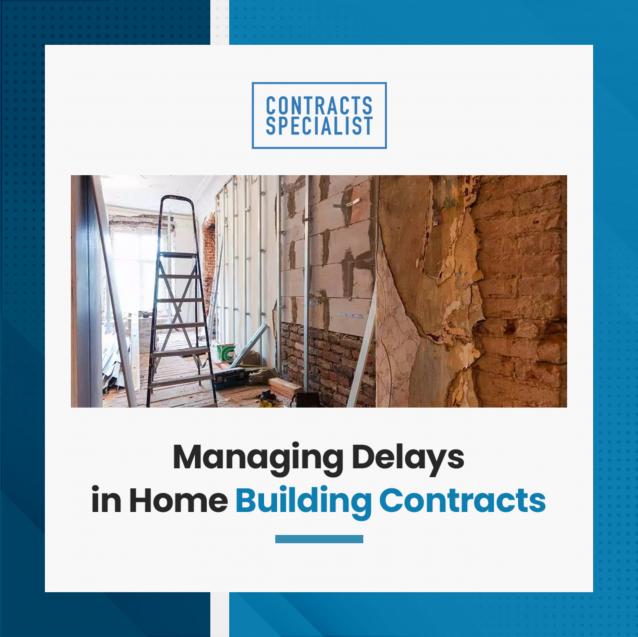
Writing a Letter of Demand
By Contracts Specialist|November 23, 2022
Sending a demand letter to the person who owes you is an essential step in getting your debts paid. In the construction industry, it's often one of the first resorts for unpaid contractors.
What is a Letter of Demand?
A letter of demand is a formal, written communication sent by one party to another, laying out their right to be given what they’re owed.
You can send a letter of demand when you have been waiting for payment from the person or company that owes you.
Sending a letter of demand is an easy and inexpensive way to enforce your rights under the Security Of Payment Act.
In which situation can you use a Letter of Demand?
This document can be used when dealing with builders, contractors, and even homeowners, who are remiss in their duty to pay progress payments.
Example situation:
Kenny is a 40-year-old subcontractor based in Sydney. He received a call from a business owner (Owner) who urgently needs him to fix his electricals. They both discussed the problem and came up with an agreement on resolving it. Kenny told his client about the price which also includes the expenses for extra materials needed to fix the electricals. The Owner agreed as he is desperate to have his electricals fixed immediately. The parties also agreed on the due date for the Owner to pay Kenny.
Kenny did everything he can to get the electricals fixed quickly. He was able to finish the works properly and correctly. However, when the due date for the payment came, he did not receive anything from the Owner. He called up the Owner and he was promised that he would get paid the following week. Kenny agreed and waited until the following week. But when the time for payment came again, Kenny still did not receive anything. He phoned his client again but this time, he could no longer reach the latter. Kenny then decided to go to his client personally. He was once again promised payment, which never came to fruition.
It is in the above situation, Kenny can send a letter of demand to enforce his right to be paid.
What are the contents of a Letter of Demand?
TIP: When you send the letter to your debtor, make sure you keep proof of mailing. This can be used as evidence against the debtor, should the matter escalate into a legal dispute.
Letter of Demand template
It is best to send the letter by express post to the registered business address.
[Address]
Dear Sir,
We refer to our outstanding payment claims which are overdue.
[insert details of whole outstanding invoices that have not been paid providing sufficient information on the claim. Examples: invoice number, invoice date, invoice amount]
This letter is not a progress claim pursuant to the Building and Construction Security of Payment Act 1999 (NSW).
If you fail to settle the outstanding debt [total debt inclusive of GST] within 7 days of receipt of this demand, we will commence enforcement action without further notice.
We will rely on this letter as to costs.
Regards,
[Your name]
What is the importance of a Letter of Demand?
When a client cannot pay you what they owe, it is important to let them know. A letter of demand will ensure that the matter gets taken care of promptly.
Also, this letter is proof that you’ve exhausted efforts in recovering the amount you’re owed.
This is an immediate resort for contractors and subcontractors, and it’s advisable to do this before taking the matter to court.
Who can help you write your Letter of Demand?
A good specialist construction lawyer will be able to help you articulate your demand effectively. Contracts Specialist is led by principal lawyer John Dela Cruz, who has over 10 years experience in construction law. His expertise includes contracts, debt recovery, and Security of Payment.
What is a Letter of Demand?
A letter of demand is a formal, written communication sent by one party to another, laying out their right to be given what they’re owed.
You can send a letter of demand when you have been waiting for payment from the person or company that owes you.
Sending a letter of demand is an easy and inexpensive way to enforce your rights under the Security Of Payment Act.
In which situation can you use a Letter of Demand?
This document can be used when dealing with builders, contractors, and even homeowners, who are remiss in their duty to pay progress payments.
Example situation:
Kenny is a 40-year-old subcontractor based in Sydney. He received a call from a business owner (Owner) who urgently needs him to fix his electricals. They both discussed the problem and came up with an agreement on resolving it. Kenny told his client about the price which also includes the expenses for extra materials needed to fix the electricals. The Owner agreed as he is desperate to have his electricals fixed immediately. The parties also agreed on the due date for the Owner to pay Kenny.
Kenny did everything he can to get the electricals fixed quickly. He was able to finish the works properly and correctly. However, when the due date for the payment came, he did not receive anything from the Owner. He called up the Owner and he was promised that he would get paid the following week. Kenny agreed and waited until the following week. But when the time for payment came again, Kenny still did not receive anything. He phoned his client again but this time, he could no longer reach the latter. Kenny then decided to go to his client personally. He was once again promised payment, which never came to fruition.
It is in the above situation, Kenny can send a letter of demand to enforce his right to be paid.
What are the contents of a Letter of Demand?
- Your full name
- The date
- Your contact details (so the debtor would know how to send the payment to you or how to reach you for a possible negotiation)
- The name of the owner and his/her business address
- The works agreed upon and the works accomplished
- The amount of money that they owe you
- Invoice details
- The due date you will set to receive your payment
- How they can pay the money (through the bank or in cash) or payment details
- Evidence to support the right to demand payment is to be attached to the letter of demand
TIP: When you send the letter to your debtor, make sure you keep proof of mailing. This can be used as evidence against the debtor, should the matter escalate into a legal dispute.
Letter of Demand template
It is best to send the letter by express post to the registered business address.
[Address]
Dear Sir,
We refer to our outstanding payment claims which are overdue.
[insert details of whole outstanding invoices that have not been paid providing sufficient information on the claim. Examples: invoice number, invoice date, invoice amount]
This letter is not a progress claim pursuant to the Building and Construction Security of Payment Act 1999 (NSW).
If you fail to settle the outstanding debt [total debt inclusive of GST] within 7 days of receipt of this demand, we will commence enforcement action without further notice.
We will rely on this letter as to costs.
Regards,
[Your name]
What is the importance of a Letter of Demand?
When a client cannot pay you what they owe, it is important to let them know. A letter of demand will ensure that the matter gets taken care of promptly.
Also, this letter is proof that you’ve exhausted efforts in recovering the amount you’re owed.
This is an immediate resort for contractors and subcontractors, and it’s advisable to do this before taking the matter to court.
Who can help you write your Letter of Demand?
A good specialist construction lawyer will be able to help you articulate your demand effectively. Contracts Specialist is led by principal lawyer John Dela Cruz, who has over 10 years experience in construction law. His expertise includes contracts, debt recovery, and Security of Payment.



